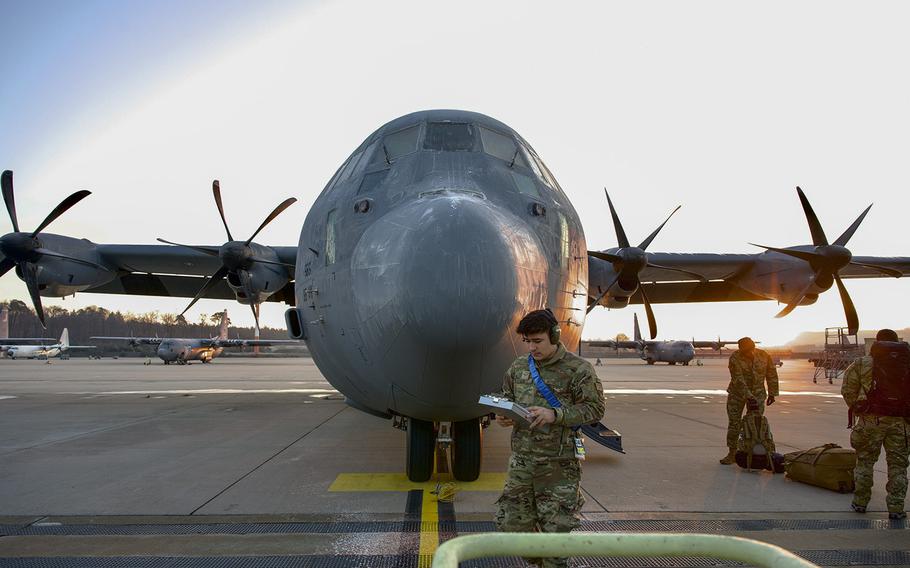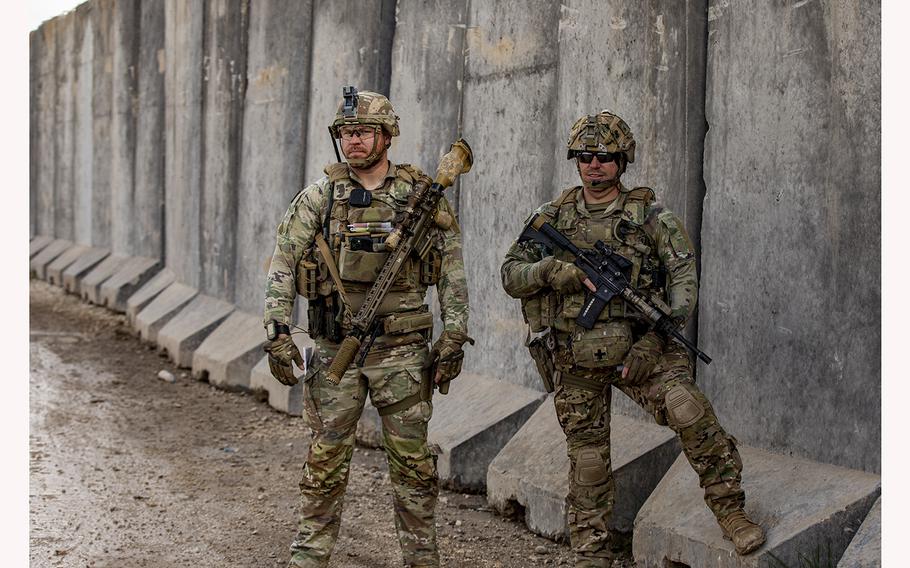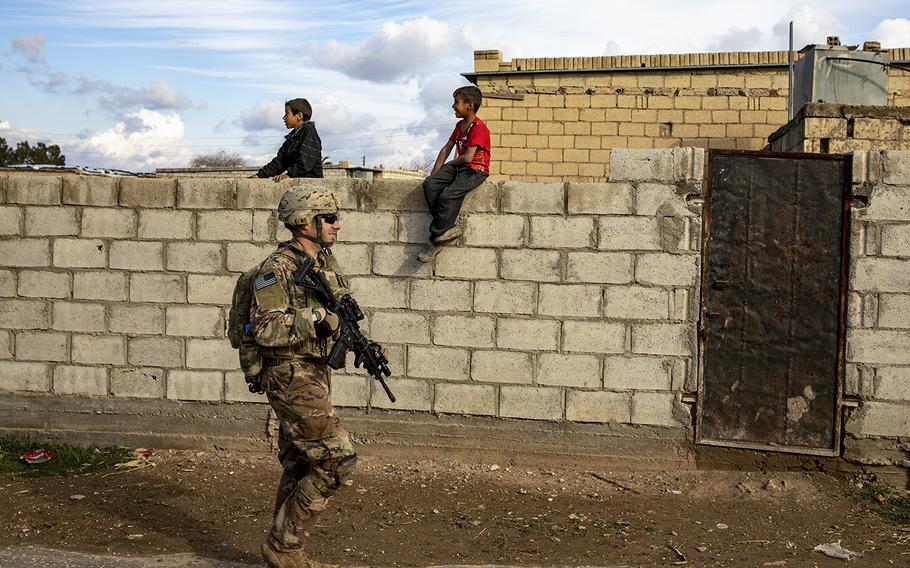
U.S. airman review a checklist before loading cargo and passengers to a C-130J Super Hercules aircraft at Ramstein Air Base, Germany, Feb. 9, 2023. The aircraft delivered airmen of various specialties to Incirlik Air Base, Turkey, to provide aid following the 7.8 earthquake that struck Turkey and Syria on Feb. 6. (Emma Quirk/U.S. Air Force )
(Tribune News Service) — Aid deliveries to tens of thousands of Syrians caught up in this week’s earthquake are being hampered by wrangling between rival powers in the country’s more than decade-long war.
“The devastation from the earthquake is unimaginable,” United Nations’ Special Envoy for Syria Geir Pedersen tweeted after a meeting of the Syria Humanitarian Task Force on Thursday, as he appealed to countries not to politicize the response. “This is about putting people first,” he said.
While supplies have flowed into heavily damaged regions of neighboring Turkey, in Syria the areas hit are mainly controlled by anti-government forces that President Bashar al Assad has been battling since 2011. That has raised tensions over aid provision that have embroiled Turkey, Russia and the U.S. and Europe amid longstanding international sanctions on Assad and his government for atrocities committed since the start of the conflict, leaving quake victims as pawns in the wider struggle over the Middle East state.
U.S. and European representatives clashed with their Russian counterpart over the sanctions at the closed-door talks in Geneva, according to a Middle East-based senior European diplomat who received the meeting’s minutes. A spokesperson for Pedersen’s office declined to comment.
The U.S. and its allies should immediately lift sanctions because their “politicized approach” hinders the provision of aid to earthquake victims, Russian Foreign Ministry spokeswoman Maria Zakharova said at a briefing Friday in Moscow. “We emphasize the need for urgent international assistance to Damascus in close coordination with the Syrian government.”
The risk is Syria and Russia seek to spin the crisis in their favor as part of a disinformation campaign that’s distracting from the rescue efforts. Syrian government channels are spreading the message that U.S. and European sanctions are impeding relief work, claims echoed in media outlets in Iran and Russia which both backed Assad in the conflict.

U.S. Army Sgt. Robert Russell and Staff Sgt. Dexter Robertson, assigned to Bravo Company, 1st Battalion, 118th Infantry Regiment, 37th Infantry Brigade Combat Team, Combined Joint Task Force - Operation Inherent Resolve, prior to a patrol, Syria, Feb. 3, 2023. (Julio Hernandez/U.S. Army)
“All we want from Europe and the U.S. now is to lift sanctions,” Assad’s adviser Bouthaina Shaaban told Sky News on Wednesday. “It is the sanctions that are making life here impossible and causing the death of people under the rubble.”
Aid workers and diplomats involved in the response reject this and accuse the government in Damascus of exploiting the situation for its own gain, saying most Syrian aid funded by Europe and the U.S. goes through U.N. agencies and their local partners based in the capital. They pointed to Syria routinely blocking international aid to rebel-held areas in the north and siphoning supplies for the rest of the country.
With the death toll in Turkey and Syria together exceeding 23,000 and with tens of thousands still trapped under the rubble of collapsed buildings, rescue workers say there’s an urgent need for medical supplies and shelters to help survivors of the disaster.
The first convoy of humanitarian aid provided by the UN was only able to cross into northwest Syria from Turkey’s Cilvegozu border post on Thursday, but the shipment is small relative to the scale of devastation there. Turkey is trying to get agreement from Russia for new border crossings to be opened to deliver aid, according to Turkish officials.
Kremlin spokesman Dmitry Peskov didn’t respond to a request to comment.
“Russia won’t be against this, providing it’s agreed with Damascus,” said Elena Suponina, a Moscow-based Middle East analyst.
Turkey and Russia are on opposing sides in northern Syria, where Turkish President Recep Tayyip Erdogan threatened in November to begin a long-delayed offensive against US-backed Kurdish forces that Ankara regards as controlled by terrorists. Russian President Vladimir Putin, who sent his military to back Assad’s troops in 2015, wants Damascus to regain control of all the country’s territory from rebel forces.
While Russia last month supported a U.N. resolution to extend the use of the Cilvegozu, or Bab al-Hawa, border crossing as the sole point of entry for international aid shipments into Syria, it has opposed opening other checkpoints allowing material to flow to rebel-held territory.
Meanwhile, nearly 50 aircraft laden with humanitarian aid and medical supplies and equipment have flown into Damascus and Aleppo since Monday, according to the Syrian Ministry of Transportation. The United Arab Emirates alone, which restored diplomatic ties with Damascus in 2019, has airlifted 640 tons of relief to both Syria and Turkey, according to the country’s news agency WAM.

U.S. Army Sgt. Kyle Luthman, assigned to Bravo Company, 1st Battalion, 118th Infantry Regiment, 37th Infantry Brigade Combat Team, Combined Joint Task Force – Operation Inherent Resolve, walks through a village during a dismounted patrol, Syria, Feb. 3, 2023. (Julio Hernandez/U.S. Army)
The idea that sanctions may be hampering the earthquake aid response has added fuel to an existing push involving Russia, Turkey and the United Arab Emirates to try to rehabilitate Assad on the international stage amid signs of a gradual rapprochement between Ankara and Damascus.
“The ball is in the Americans’ court,” said Ebtesam Al-Ketbi, who runs the UAE-based Emirates Policy Center. “The UAE has been open to Syria and bringing Syria back into the Arab fold but without removing the sanctions, no one can get help with reconstruction.”
Western powers say the main reason for the sanctions is to compel Assad to agree to meaningful political reforms, something he has refused to do.
Still, the U.S. on Thursday said it was easing restrictions on money transfers to Syria until early August to facilitate earthquake relief. It also announced $85 million in humanitarian assistance to Turkey and Syria.
The European Union has activated its Civil Protection Mechanism which allows for aid to flow directly to government-controlled areas of Syria as well.
For thousands of Syrians whose lives have been shattered by the disaster and who urgently need assistance, the political maneuvering seems very distant from their concerns.
“People are dying slowly,” said Ikram Habboush, a physician in Idlib, one of the worst hit areas, by phone. “We need help now however you bring it to us.”
With assistance from Zainab Fattah, Firat Kozok, Kateryna Kadabashy and Onur Ant.
©2023 Bloomberg L.P.
Visit bloomberg.com.
Distributed by Tribune Content Agency, LLC.